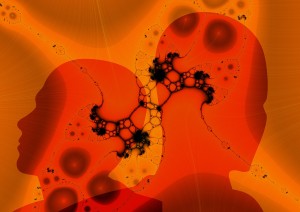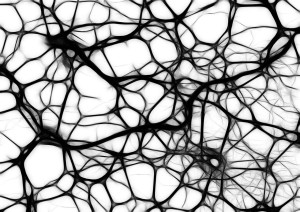- Calls to this hotline are currently being directed to Within Health or Eating Disorder Solutions
- Representatives are standing by 24/7 to help answer your questions
- All calls are confidential and HIPAA compliant
- There is no obligation or cost to call
- Eating Disorder Hope does not receive any commissions or fees dependent upon which provider you select
- Additional treatment providers are located on our directory or samhsa.gov
Hormones & Binge Eating Disorder

Contributor: Ginger Nicol, MD, McCallum Place

Adipokines

Leptin is produced primarily by adipose tissue and to a lesser degree by the GI tract in response to food intake. Positive energy balance triggers leptin release, which sends satiety signals to the hypothalamus. Leptin levels are directly correlated with body weight, and just as weight gain is associated with the development of insulin resistance (a precursor to type 2 diabetes), it can also lead to leptin resistance.[2] This is the decreased ability of receptors in the brain to detect satiety with increasing levels of leptin. In individuals with BED, leptin levels rise with food intake, but don’t appear to be associated with satiety. And interestingly, this lack of response to leptin may not be weight dependent, as it has been observed in both normal- and high-weight individuals with BED.[3] Although we can’t conclude that abnormal leptin signaling causes or cures BED, it likely contributes to the lack of satiety many individuals with BED experience.
Adiponectin

Gut peptides
Hormones made by the gastrointestinal or GI system are commonly referred to as “gut” hormones or peptides, which are essentially smaller versions of proteins. These hormones help to signal hunger and satiety to the brain in a more immediate fashion than adipokines, as well as exerting some control over digestion.
- Grehlin is a peptide hormone produced by the stomach, rising before meals and decreasing afterwards. Grehlin levels also increase slowly throughout the day, with highest levels just before dinnertime. This hormone serves two important roles in energy balance: first, it signals to the brain causing an acute increase in food intake while also speeding gastric emptying and increasing gut motility; second, it contributes to the pleasurable experience of eating, particularly for energy dense foods like those high in fat and sugar. Over time, elevations in grehlin can lead to a significant shift in food preferences to these more palatable, energy dense foods. In higher weight individuals, fasting grehlin levels are lower, increase more prior to eating and throughout the day, and decrease less following meals or snacks. Unlike leptin, the relationship between grehlin and body weight does not appear to differ between people with BED and those without it,[6] but in animals models of BED, grehlin is apparently associated with increased reward signaling in the brain during high fat food consumption.[7] Interestingly, grehlin levels increase during weight loss, which may contribute to “rebound” weight gain that often follows dieting. And finally, grehlin levels increase during periods of psychological and physical stress…so the drive to eat that some of us experience when going through stressful periods may be at least in part biologically mediated. Similar to leptin, it is unclear whether these differences seen in higher weight people cause or are the effect of weight gain. However, it does seem that higher grehlin levels contribute to decreased satiety and may also be associated with a lower reward response to palatable foods.[8] Thus, for high weight individuals with BED, it may be more difficult to change eating preferences and to lose weight due to grehlin.
- Glucagon like peptide-1 (GLP-1) is released by the lower part of the gut and slows gastric emptying, which leads to feeling full. However, more recently research has revealed that GLP-1 may play a role in central nervous system satiety signaling. Although GLP-1 levels do not appear to differ in BED versus non-BED individuals,[9] it may be a relevant treatment target in individuals with BED associated with low estrogen (see below). GLP-1 analogues like exenatide (Saxenda) and liraglutide (Victoza) are antidiabetes agents that have also been approved by the Food and Drug Administration as weight loss drugs.
Sex Hormones

- Estrogen is made by the ovaries (and also by placenta in pregnancy) and is necessary for the development of female body characteristics as well as for ovulation. But estrogen also indirectly increases the concentration and effect of serotonin in the brain. Lower levels of serotonin are correlated with increased binge behavior,[10] and selective serotonin receptor inhibitors (SSRIs) which increase serotonin in the brain, are effective at decreasing binge behavior in both bulimia and in BED.[11] Women who have abnormal menstrual cycles have been shown to have a tendency towards binge eating, and as women age, decreasing estrogen levels are associated with changes in both mood and appetite. In mice, GLP-1 can target CNS serotonin receptors and have the same effect of decreasing appetite while also having a beneficial effect on peripheral tissue insulin sensitivity. [12] Although estrogen replacement therapy is not generally recommended due to concerns about it increasing the risk for cardiovascular disease, it is helpful to know that the changes in appetite associated with age have a real biological underpinning. Additionally, SSRI treatment may help with both appetite and mood symptoms associated with decreasing estrogen levels.
- Progesterone is produced by the ovary and placenta, and is necessary for preparing the uterus for and sustaining pregnancy. In patients with Bulimia Nervosa, binge episode frequency fluctuates with the hormonal fluctuations of the menstrual cycle. There is less evidence linking progesterone to binge eating in BED, but a few studies indicate that in non-clinical populations, the time of greatest binge frequency during a regular menstrual cycle coincides with the lowest levels of estrogen and the highest levels of progesterone – typically in the premenstrual and menstrual portions of the cycle. [13] However, this also happens to be the time of greatest weight fluctuation (increase) during the menstrual cycle and is associated with greater weight preoccupation and emotional eating. [14]
- Testosterone is a sex hormone made by the testes in men and also by the ovaries in women. It is associated with development and maintenance of secondary sex characteristics in men, and in women contributes to the development of bones and lean muscle mass. There is even less data regarding the role testosterone plays in binge eating, but there is evidence to suggest that higher levels of testosterone are associated with increases in appetite and increased food intake. In women with bulimia, higher levels may be associated with decreased impulse control during eating and resultant increases in purging behaviors; these symptoms appear to be ameliorated by the use of oral contraception. [15]
Conclusions
In summary, there are many hormones that contribute to appetite regulation and energy balance in humans; a few of these can be altered in binge eating and in BED and many of the known actions can help to predict risk for binge eating as well as suggest potential treatment targets for the disorder.
About the Author:
Dr. Ginger Nicol graduated with her bachelor’s in Journalism and Mass Communications from the University of Iowa in 1998, and received her medical degree from the University of Iowa Carver College of Medicine in 2002. She fulfilled both residency in General Psychiatry and fellowship in Child & Adolescent Psychiatry at Washington University School of Medicine (WUSM) in 2007. In 2010, she completed a National Institute of Drug and Alcohol Abuse (NIDAA) post-doctoral research fellowship in obesity and metabolic disorders in psychiatric populations at WUSM. Dr. Nicol is Assistant Professor of Psychiatry WUSM and has served as teaching and research faculty at the WUSM Department of Psychiatry since 2007.
References
- 1. Kessler RC, Berglund PA, Chiu WT, Deitz AC, Hudson JI, Shahly V, Aguilar-Gaxiola S, Alonso J, Angermeyer MC, Benjet C, Bruffaerts R, de Girolamo G, de Graaf R, Maria Haro J, Kovess-Masfety V, O’Neill S, Posada-Villa J, Sasu C, Scott K, Viana MC, Xavier M. The prevalence and correlates of binge eating disorder in the world health organization world mental health surveys. Biol Psychiatry. 2013;73:904-914
- 2. Wilsey J, Zolotukhin S, Prima V, Scarpace PJ. Central leptin gene therapy fails to overcome leptin resistance associated with diet-induced obesity. Am J Physiol Regul Integr Comp Physiol. 2003;285:R1011-1020
- 3. Geliebter A, Yahav EK, Gluck ME, Hashim SA. Gastric capacity, test meal intake, and appetitive hormones in binge eating disorder. Physiology & behavior. 2004;81:735-740
- 4. Lihn AS, Pedersen SB, Richelsen B. Adiponectin: Action, regulation and association to insulin sensitivity. Obes Rev. 2005;6:13-21
- 5. Monteleone P, Fabrazzo M, Martiadis V, Fuschino A, Serritella C, Milici N, Maj M. Opposite changes in circulating adiponectin in women with bulimia nervosa or binge eating disorder. J Clin Endocrinol Metab. 2003;88:5387-5391
- 6. Gluck ME, Yahav E, Hashim SA, Geliebter A. Ghrelin levels after a cold pressor stress test in obese women with binge eating disorder. Psychosom Med. 2014;76:74-79
- 7. Valdivia S, Cornejo MP, Reynaldo M, De Francesco PN, Perello M. Escalation in high fat intake in a binge eating model differentially engages dopamine neurons of the ventral tegmental area and requires ghrelin signaling. Psychoneuroendocrinology. 2015;60:206-216
- 8. Perello M, Zigman JM. The role of ghrelin in reward-based eating. Biol Psychiatry. 2012;72:347-353
- 9. Geliebter A, Hashim SA, Gluck ME. Appetite-related gut peptides, ghrelin, pyy, and glp-1 in obese women with and without binge eating disorder (bed). Physiology & behavior. 2008;94:696-699
- 10. van Strien T, van der Zwaluw CS, Engels RC. Emotional eating in adolescents: A gene (slc6a4/5-htt) – depressive feelings interaction analysis. J Psychiatr Res. 2010;44:1035-1042
- 11. Leombruni P, Piero A, Lavagnino L, Brustolin A, Campisi S, Fassino S. A randomized, double-blind trial comparing sertraline and fluoxetine 6-month treatment in obese patients with binge eating disorder. Prog Neuropsychopharmacol Biol Psychiatry. 2008;32:1599-1605
- 12. Cao X, Xu P, Oyola MG, Xia Y, Yan X, Saito K, Zou F, Wang C, Yang Y, Hinton A, Jr., Yan C, Ding H, Zhu L, Yu L, Yang B, Feng Y, Clegg DJ, Khan S, DiMarchi R, Mani SK, Tong Q, Xu Y. Estrogens stimulate serotonin neurons to inhibit binge-like eating in mice. J Clin Invest. 2014;124:4351-4362
- 13. Klump KL, Keel PK, Culbert KM, Edler C. Ovarian hormones and binge eating: Exploring associations in community samples. Psychol Med. 2008;38:1749-1757
- 14. Hildebrandt BA, Racine SE, Keel PK, Burt SA, Neale M, Boker S, Sisk CL, Klump KL. The effects of ovarian hormones and emotional eating on changes in weight preoccupation across the menstrual cycle. Int J Eat Disord. 2015;48:477-486
- 15. Naessen S, Carlstrom K, Bystrom B, Pierre Y, Hirschberg AL. Effects of an antiandrogenic oral contraceptive on appetite and eating behavior in bulimic women. Psychoneuroendocrinology. 2007;32:548-554
The opinions and views of our guest contributors are shared to provide a broad perspective of eating disorders. These are not necessarily the views of Eating Disorder Hope, but an effort to offer a discussion of various issues by different concerned individuals. We at Eating Disorder Hope understand that eating disorders result from a combination of environmental and genetic factors. If you or a loved one are suffering from an eating disorder, please know that there is hope for you, and seek immediate professional help.
Last Updated & Reviewed By: Jacquelyn Ekern, MS, LPC on September 3, 2015. Published on EatingDisorderHope.com
